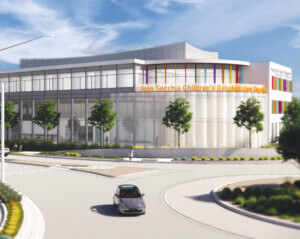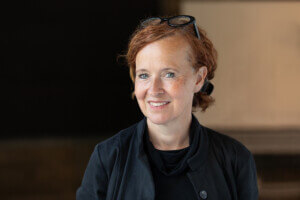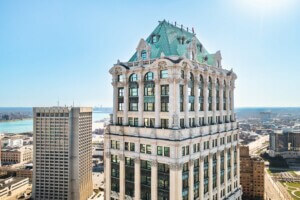When Ford Motor Company took stock of its current 60-year-old Dearborn, Michigan, facilities, it became clear that the only way forward would be to take a big leap into two new high-tech campuses. Spearheading the master plans is the Detroit office of SmithGroupJJR. When completed, the estimated $1.2 billon, ten-year project will involve moving 30,000 employees from 70 buildings into a Product Campus and a Headquarters Campus. Throughout the project, the entire campus will also have to stay 100 percent operational.
One of Ford’s primary goals will be to improve the health and well-being of its employees. To do so, SmithGroupJJR has incorporated the seven concepts of the WELL Building Standard, a matrix that addresses air, water, nourishment, light, fitness, comfort, and mental and emotional health of employees. The 7.5 million square feet of new and remodeled workspace will include ample natural light, diverse workstation configurations, social hubs, and various sizes of collaborative workspaces. These workspaces will add up to one conference room or meeting space for every seven workers. The campus will include walkable paths between buildings, green spaces, cafes, and on-site fitness centers.
“The premise is we are doing buildings that are flexible enough that however they choose to work and collaborate, whether by project team or skill team or a combination of both, that the facility would support different types of organization,” explained SmithGroupJJR principal Carl Roehling, describing how the design was developed with Ford’s changing work model in mind. “We are allowing them to evolve into it and change the way they are working by getting the buildings out of the way of their changing organization.”
Sustainability is also a major concern for Ford, as it sees the campus as a part of its larger push to rethink the company and its products. The design calls for a minimum Silver certification through the U.S. Green Building Council’s Leadership in Energy & Environmental Design process as well as LEED Gold certification. A new Sustainability Showcase building on the Product Campus will be net-zero waste, net-zero energy, and net-zero water. Geothermal heating and cooling and solar-power generation mean the building will be able to produce more energy than it uses. As a whole, the campuses will reduce Ford’s energy consumption by 50 percent over its current Dearborn spaces.
Not only will the campus utilize the latest technology to achieve its sustainable goals, the campus itself will be used as a testing ground for Ford’s latest designs and development. In a shift from being a dedicated auto company, Ford has launched the Ford Smart Mobility plan. The plan aims to investigate connectivity, mobility, technology, customer experience, and big data. As part of the investigation, 25 global experiments have been launched, including three in Dearborn. The experiments will include Dearborn employees testing rapid charging and car sharing, big-data collection, and a car-swap program. As Ford’s main research and development facilities, the campuses will also have access to the latest in autonomous vehicles, on-demand shuttles, and eBikes.
At the heart of the Product Campus will be a new 700,000-square-foot Design Center, which will include new design studios and an outdoor design courtyard. The current Design Showroom will be converted into an event space. Construction has already begun on the Product Campus, including the Design Center and the Research and Engineering Center, with a goal of completion in 2023.
The second campus will comprise of the Ford World Headquarters and the Ford Credit facility. With plans to begin in 2021, this campus will maintain the iconic appearance of the current SOM-designed Ford Headquarters from 1956, while renovating 1.3 million square feet of workspace. Employees will also have access to new outdoor recreation facilities, including softball and soccer fields, and a renewed Arjay Miller Arboretum. Other greenspaces will include native plantings and large tree-shaded areas.
Along with Ford’s recently completed Palo Alto campus, the new Dearborn campuses will be the model on which Ford plans to update all of its facilities worldwide. At 199,000 employees and 67 plants spread across the globe, this will be no small task. With these new bold campuses, Ford has shown that its built environment is going to be integral to its next 100 years.










